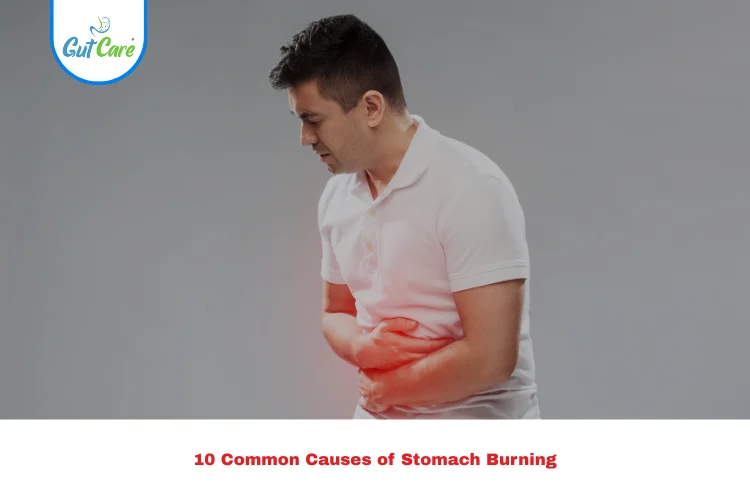Table of Contents
Gallstones can be a painful and disruptive condition, impacting your overall health and well-being. If you’ve been diagnosed with gallstones, adjusting your diet is crucial to managing symptoms and preventing further complications. At GutCare Clinics, we’re committed to helping you navigate these dietary changes. In this blog, we’ll explore the foods you should avoid if you have gallstones and provide tips for maintaining a healthy diet.
Understanding Gallstones
Gallstones are solid deposits that develop in the gallbladder, a small organ situated below the liver. They can vary in size and may cause no symptoms or lead to severe discomfort. Gallstones can develop when there is an imbalance in the substances that make up bile, such as cholesterol or bilirubin.
Symptoms of gallstones can include:
- Severe abdominal pain, particularly in the upper right side
- Nausea and vomiting
- Indigestion
- Jaundice (yellowing of the skin and eyes)
- Fever
To manage gallstones effectively, dietary adjustments are often necessary. Let’s dive into which foods should be avoided and why they can exacerbate gallstone symptoms.
Foods to Avoid with Gallstones

- Fried and Fatty Foods
High-fat foods, especially those that are fried, can trigger gallbladder attacks and worsen symptoms. These foods increase the cholesterol level in bile, contributing to gallstone formation. Avoid:
- Fried chicken
- French fries
- Potato chips
- Donuts and other pastries
Opt for baked, grilled, or steamed options instead. Choosing lean proteins like chicken breast and fish can help reduce the fat intake.
- High-Cholesterol Foods
Foods high in cholesterol can contribute to the formation of gallstones. Limiting these foods helps manage cholesterol levels and prevent further gallstone development. Avoid:
- Red meat (beef, pork, and lamb)
- Full-fat dairy products (whole milk, cheese, and butter)
- Organ meats (liver and kidney)
Instead, focus on lean cuts of meat and low-fat or non-dairy alternatives.
- Processed and Refined Foods
Processed foods are often high in unhealthy fats, sugars, and refined carbohydrates. These can disrupt bile production and exacerbate gallstone symptoms. Avoid:
- White bread and pasta
- Sugary snacks and desserts
- Processed meats (sausages, hot dogs, and bacon)
- Convenience foods (frozen dinners, instant noodles)
Choose whole grains, fruits, and vegetables for better digestive health and reduced risk of gallstone complications.
- Sugary Foods and Beverages
Excess sugar can contribute to weight gain and imbalances in bile composition. Maintaining a healthy weight is crucial in managing gallstones. Avoid:
- Sodas and sugary drinks
- Candy and chocolate
- Sweetened cereals and pastries
Instead, opt for water, herbal teas, and fresh fruits. Natural sugars found in fruits are generally better for your health compared to processed sugars.
- Dairy Products High in Fat
High-fat dairy products can exacerbate gallbladder issues. While dairy is a good source of calcium and other nutrients, choosing lower-fat options can help manage symptoms. Avoid:
- Whole milk
- Cream
- Full-fat cheeses
Switch to skim milk, low-fat yogurt, and reduced-fat cheeses to minimize fat intake while still obtaining essential nutrients.
- Spicy Foods
For some individuals, spicy foods can trigger gallbladder pain and discomfort. If you notice that spicy foods worsen your symptoms, it’s best to limit or avoid:
- Hot sauces
- Spicy seasonings
- Chili peppers
Opt for milder herbs and spices like basil, thyme, and parsley to add flavor without causing irritation.
- Alcohol
Alcohol can contribute to gallbladder inflammation and should be avoided if you have gallstones. It can also interfere with digestion and exacerbate symptoms. Limiting or eliminating alcohol from your diet can help in managing gallstone symptoms effectively.
Tips for a Gallstone-Friendly Diet
- Increase Fiber Intake
Fiber helps improve digestion and can aid in managing gallstone symptoms. Include plenty of:
- Fruits (apples, pears, and berries)
- Vegetables (leafy greens, broccoli, and carrots)
- Whole grains (oats, quinoa, and brown rice)
- Stay Hydrated
Drinking plenty of water helps keep bile diluted and supports overall digestive health.Aim to drink a minimum of 8 glasses of water each day.
- Include Healthy Fats
While you should avoid unhealthy fats, incorporating healthy fats in moderation can be beneficial. Foods high in omega-3 fatty acids and monounsaturated fats, including
- Fatty fish (salmon, mackerel, and sardines)
- Nuts and seeds like chia seeds, flaxseeds, and almonds
- Olive oil and avocado
These can help reduce inflammation and support overall health.
- Eat Small, Frequent Meals
Eating smaller, more frequent meals throughout the day can help manage gallbladder function and reduce discomfort. This approach helps prevent the gallbladder from becoming overworked.
- Maintain a Healthy Weight
Being overweight can increase the risk of gallstones. Adopting a balanced diet and regular exercise routine can help manage weight and reduce gallstone-related symptoms.
Conclusion
Managing gallstones often requires significant dietary changes. By avoiding high-fat, high-cholesterol, and processed foods, and focusing on a diet rich in fiber and healthy fats, you can effectively manage your symptoms and improve your overall digestive health.
At GutCare Clinics, we are dedicated to providing personalized care and guidance for managing gallstones. If you have any concerns or need help creating a diet plan tailored to your needs, don’t hesitate to contact us. Our expert team is here to support you every step of the way.
For more information on managing gallstones or to schedule a consultation, give us a call today. Let us help you take control of your health and well-being.




